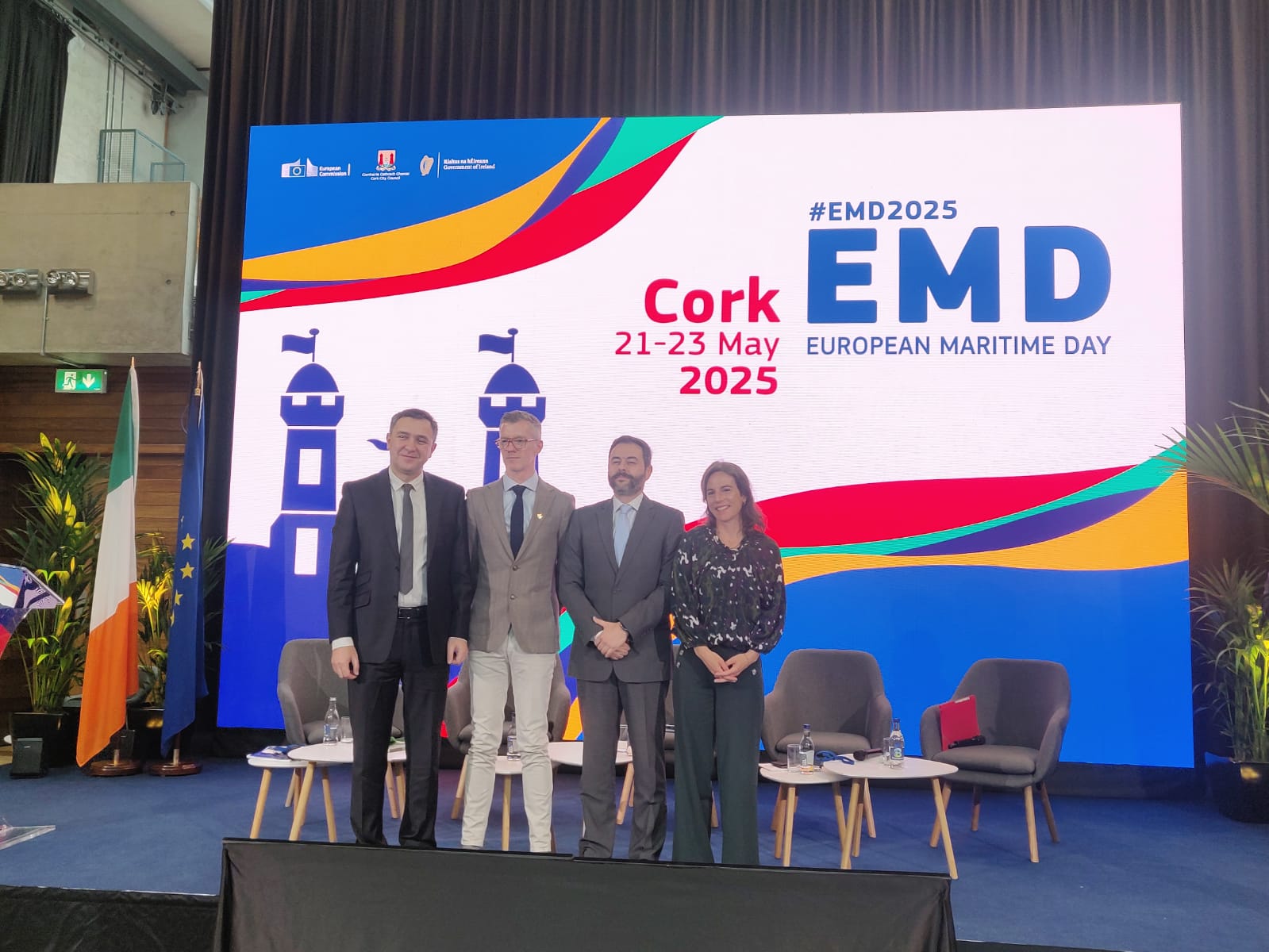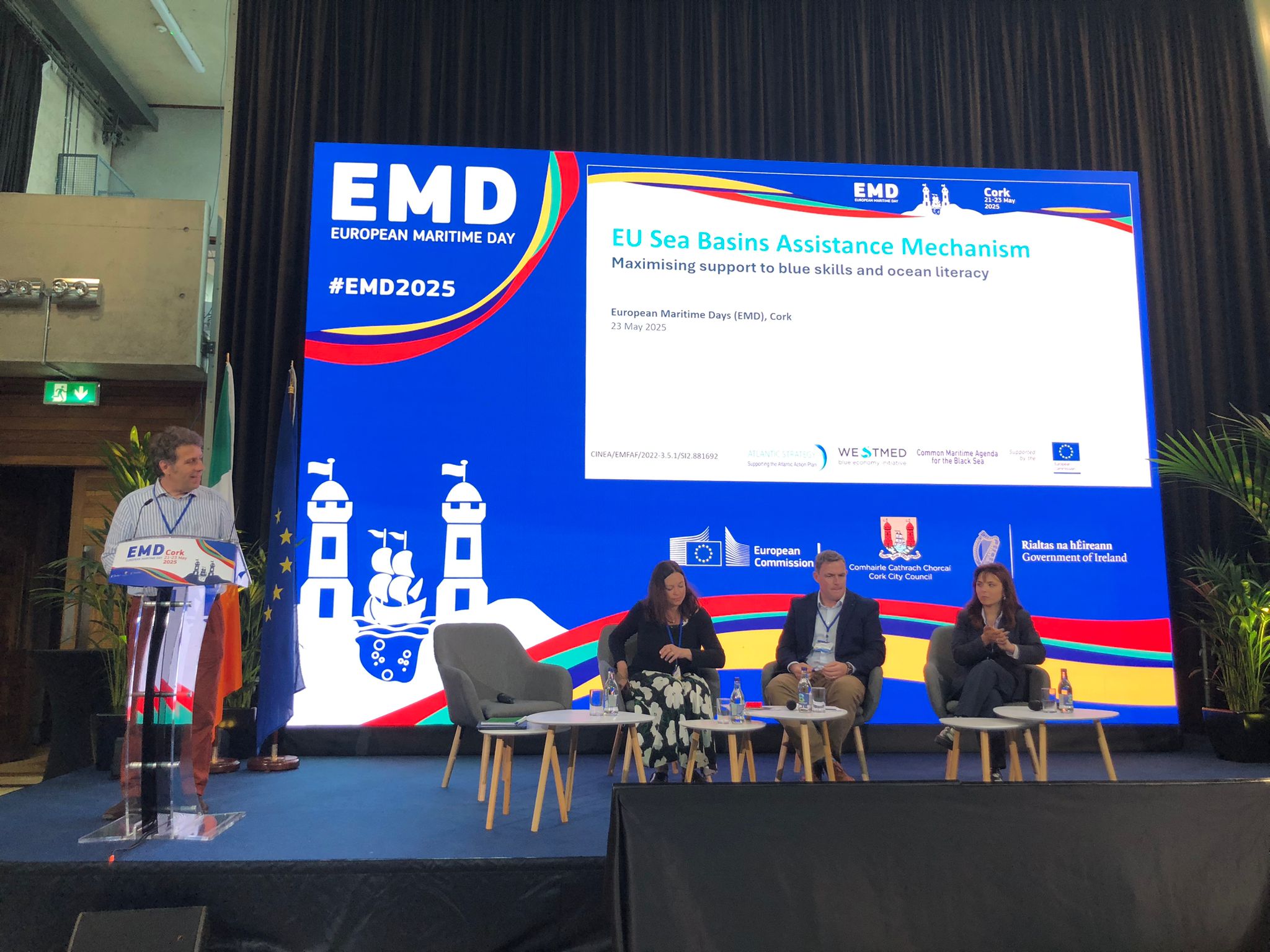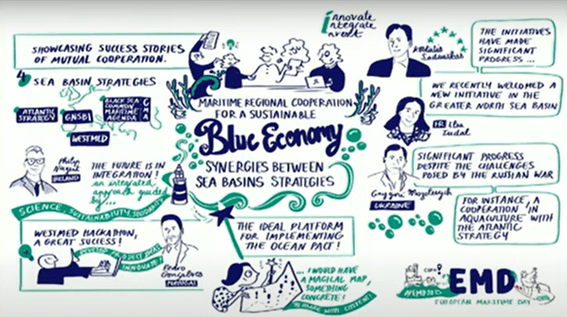The 2025 edition of European Maritime Day (EMD) — the flagship annual gathering for blue economy stakeholders across Europe — took place this year in Cork, Ireland. The event brought together about 1,200 participants amongst policymakers, experts, and practitioners from key maritime sectors to strengthen collaboration and advance the EU’s blue economy agenda.
For the third year in a row, the EU Sea Basin Strategies featured prominently at EMD, showcased as essential frameworks for fostering regional cooperation and supporting the implementation of EU blue economy policy goals.
High level panel on synergies between sea basins

The 2025 EMD in Cork hosted the second edition of the High-Level Panel on Synergies between Sea Basin Strategies, bringing together representatives from four sea basin strategies:
Philip Nugent, Director-General for Maritime Affairs at Department of the Environment Climate and Communications in Ireland, representing the Atlantic Strategy (and EMD co-host);
Pedro Gonçalves, Director for Strategy at the Directorate General for Maritime Affairs in Portugal, representing the WestMed Initiative;
Hryhorii Mozolevych, Director General at the Science Development Directorate of Ministry of Education and Science of Ukraine, representing the Black Sea Common Maritime Agenda;
Elsa Tudal, Project Director for European and International affairs at the Ministry for the Ecological Transition, Biodiversity, Forestry and Fisheries in France, representing the Greater North Sea Basin Initiative.
The panel was moderated by Seamus Kearney, director of Seamus Kearny Media.
Kestutis Sadauskas, Deputy Director-General at DG MARE, opened the panel by stating that “cooperation and coordination lie at the heart of sea basin strategies” and considered them central in tackling the very diverse maritime challenges Europe faces today, while extending the approach to EU neighbouring countries. He also stressed how EU Sea Basin Strategies can act as essential place-based initiatives to further implement the EU Ocean Pact across the EU.
Tackling shared challenges through successful cooperation across sea basins
Building on the discussions from the first edition of the High-Level Panel at EMD 2024 in Svendborg, Denmark, this year's panel reviewed progress made in implementing the sea basin strategies’ political priorities and showcased success stories of mutual cooperation, both at the political and technical levels.
Phillip Nugent highlighted how Ireland’s involvement in the Atlantic and GNSBI strategies has been “hugely beneficial to give us a sense of how other Member States are tackling challenges that we have faced ourselves”. Successful technical cooperation examples, such as dedicated expert groups across key maritime sectors, and the articulation and cross-fertilisation across sea basins were highlighted both by the Portuguese Co-Presidency of the WestMED Initiative (Pedro Gonçalves) and Grygorii Mozolevych (Ukraine) representing the Common Maritime Agenda for the Black Sea. In particular, Mozolevych emphasized that cross-sea basin cooperation in the context of sea basin strategies “is not just symbolic, but has real operational value”. As a relatively new established initiative, the French Co-presidency of the GNSBI (represented by Elsa Tudal) described the initiative as a “test lab” for transfer of knowledge and experience from existing initiatives, building a more integrated and holistic approach for the blue economy in the region.
Driving innovation, connectivity and sustainable energy
Panellists also underlined the importance of maritime regional cooperation in driving innovation, connectivity, and sustainable energy across Europe and beyond.
Portugal highlighted how the WestMED initiative is acting as a “platform for innovation” and delivering on the EU Green Deal objectives, particularly on decarbonisation, green ports and blue energy. Hackathons were exemplified as drivers for new blue innovations and competitiveness, bringing together young researchers and entrepreneurs in the region.
Ukraine focused on how the CMA is contributing towards a circular economy, digital transformation and ecosystem restoration in the Black Sea. As an example, the CMA is promoting low impact aquaculture farming techniques. The Ukrainian coordination announced that strategies to tackle war-related environmental damage will constitute a major priority during their term.
Ireland described sea basins as examples of the -currently threatened- multilateralist cooperation approach, and as constituting “sandboxes of implementation (in a shared basis) of EU policy”. In fact, great potential for increased cross-sea basin synergies exists when it comes to the expansion of marine renewable energies, taking into account regional specificities and needs.
France reaffirmed that a viable blue economy today or in the future “cannot exist without regional cooperation”. It is therefore the vision of the GNSBI to ensure coordination across traditional and emerging sectors. The importance of maritime spatial planning was stressed for this purpose.
Synergetic potentials and enabling role of sea basins for promoting EU initiatives
Moreover, the discussion provided insights on the role of the four Sea Basin Strategies in delivering on the objectives of future EU initiatives, such as the European Ocean Pact. And the common commitment for promoting greater synergies across EU Sea Basins in relevant economic sector and policy activities.
Ireland underlined how SBS can deepen cooperation to achieve greater integrated approaches to maritime governance guided by science. Similarly, Portugal sees the SBS as well positioned to become an “operational arm of the new Ocean Pact”, as natural platforms to translate the Pact’s ambitions into action. France pointed out the need for greater cooperation and integration of maritime policies, and called for greater investment support. Finally, Ukraine stressed the particularly important role of regional cooperation driven by SBS in a politically sensitive region such as the Black sea, contributing to increased maritime safety and security.
Moreover, all panellists agreed on the critical role of sea basin level cooperation in addressing climate change challenges whereby coastal communities are at the forefront.
KEY QUOTE: “The Ocean Pact is a place-based policy making approach that needs to be brought to real life - our sea basin strategies are the perfect vehicle for testing these ideas”. Kestutis Sadauskas |
Workshop on Blue Skills & Ocean Literacy

As a follow-up to the High Level Panel, an operational workshop was held to examine how the EU Sea Basins Assistance Mechanism can strengthen blue skills development in pivotal innovation areas while promoting greater ocean literacy across coastal communities engaged in the blue economy across the EU and its neighbouring countries. These are in fact two essential areas where sea basin presidencies and coordinators have expressed growing interest, towards a deeper policy and technical collaboration within and across each sea basin.
The workshop brought together the following speakers:
Matteo Bocci, EU Sea Basins AM, providing some policy feedback as emerging from the experience of EU Sea Basins and acting as moderator;
Alessandro Pititto, COGEA, presenting the recent study by CINEA;
Olga Mashkina, EU4Ocean, illustrating lessons learned from the actions promoted particularly in the area of ocean literacy;
Paul Hegarty, Marine Ireland Industry Network, offering some reflections from the grassroots level in relation to key innovation skill-sets;
The session highlighted the current state of initiatives within the sea basin regions and identified further opportunities to leverage existing efforts. The EU Sea Basin Policy Feedback presented some patterns in promotion of projects related to blue skills and ocean literacy, with greater focus on innovative sectors (e.g. biotechnologies and renewable energy) emerging in the Atlantic region, a more transversal approach addressing ecosystem challenges adopted in the Black Sea and an in-between positioning of the western Mediterranean. COGEA presented the main results of the study on Blue Skills and its proposed Competence Framework to be soon launched as a result of the study commissioned by DG MARE and CINEA. EU4Ocean’s contributions stressed the relevance of ocean education and literacy, including towards young professionals, as well as private sectors and blue economy businesses, with a dedicated new group to be launched in this area as well as a dedicated campaign and a blue cities network acting in this area. Finally, an overview of innovation and related skill-sets required by local practices was offered by the Marine Ireland Industry Network, with an interesting balance between transversal technical skills and the need for place and sector-based competences to adapt emerging innovations (digital, greening, etc.).
The workshop marked a step forward in aligning regional strategies with broader EU goals for sustainable ocean use and economic growth in maritime sectors. It also pointed out the relevance of sea basin specific data analysis to be collected and offered across the EU, as to compare trends, challenges and opportunities that characterise each EU region and foster greater cross sea basin cooperation and exchange of lessons learned as well as success stories.
The EU Sea Basin Assistance Mechanism will build upon the outcomes of the session, as a way to further follow-up on the outcomes of the AMD High Level Panel and to foster greater cooperation and exchanges amongst the EU sea basins as well as EU macro regions – including as part of the upcoming EU Macro Regions and Sea Basins Days.

